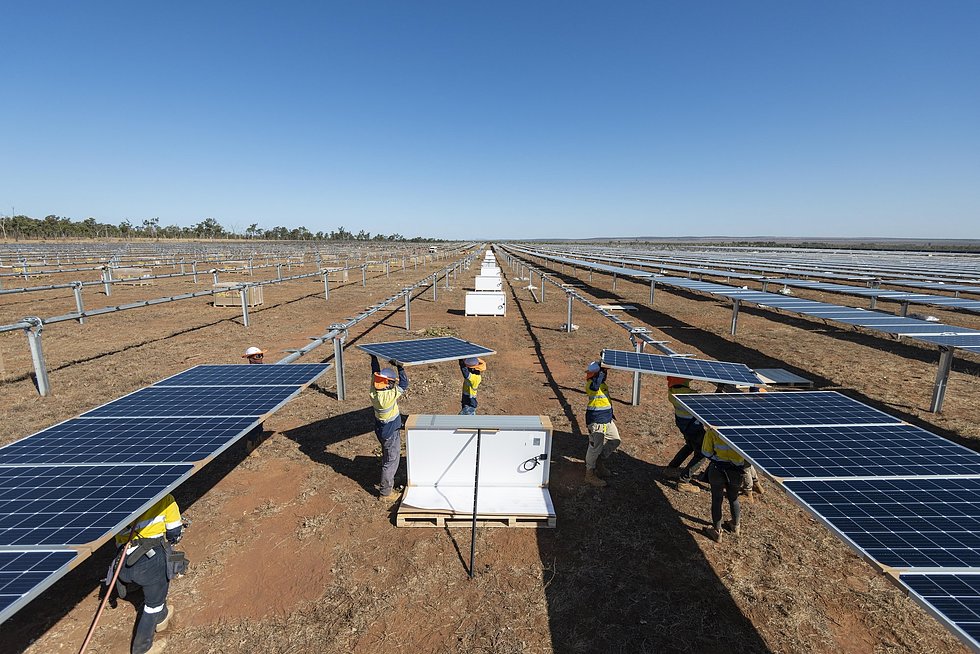Rystad senior analyst David Dixon said utility battery energy storage systems were the leading technology, constituting more than 55% of total capacity added to the company’s renewable energy project database in the three months to 31 March 2024.
Utility scale PV followed with 30 projects with a combined 6 GW of capacity added to the project pipeline database.
Dixon said construction began on 2.5 GW of utility PV, wind, and battery projects in Australia in in the first quarter of 2024, with utility batteries accounting for a quarterly construction start record of 1,665 MW of capacity.
The downside was the pace of utility wind and solar build with Rystad estimating that at least 2.1 GW of large-scale and wind projects needs to start construction each quarter through to Q4 2028 to achieve the government’s 82% renewables by 2030 target.
Dixon’s estimation is a feat never achieved before in the Australian market and comes as a report highlights a “critical need” for planning reforms to drive investment in renewable energy, storage, and transmission projects essential for meeting emissions targets.
The Clean Energy Investor Group (CEIG) report notes that “inconsistent and unclear planning assessment processes” are leading to project delays and increased costs.
The Delivering Major Clean Energy Projects report, prepared by law firm Herbert Smith Freehills, identifies key “pinch points” in planning approval processes and shows solar, wind and battery energy storage projects are routinely waiting six months to two years for state planning permission.
In Victoria, the average number of days between acceptance of an application and the responsible authority making a decision was 376 days in the 2023 financial year. In Queensland, where a lack of centralised data makes it difficult to make comparisons, seven wind farms took an average of 190 days to gain planning approval between 2019 and 2021.
An earlier CEIG analysis of New South Wales (NSW) planning processes found that over the five years to November 2023, average approval timeframes were 746 days for solar, wind and battery projects, and 492 days for hydro and transmission projects.
CEIG Chief Executive Officer Simon Corbell said though planning processes are vital for effective implementation, they currently face numerous challenges, and the report shows a clear need for planning and development reform.
“This report underscores the urgent need to address delays and inefficiencies that hinder progress on critical clean energy investments, imperative for meeting emissions reduction targets,” he said.
Corbell said the report identifies key areas where planning processes could be improved, including establishing clearer and more consistent consultation requirements for proponents, developing a data-sharing platform for regulators, proponents and operators, and streamlining interaction between states and the Commonwealth.
“Investment in clean energy projects is urgently needed to achieve net zero targets,” he said. “Planning processes can be enhanced to improve outcomes for communities, the environment and clean energy investment.”
Several states have already moved to fast-track renewables with NSW committing to reform its planning approvals process with the government aiming to green light almost 50 large-scale solar, wind, and battery storage projects this year.
The Victorian government has announced it would make renewable energy eligible for accelerated approvals pathway by treating them as “significant economic development”, which would remove the planning panel process and third-party appeals.
The government said the change means that from the time a complete application is lodged for one of these new state significant projects, decisions can be made within four months.
This content is protected by copyright and may not be reused. If you want to cooperate with us and would like to reuse some of our content, please contact: editors@pv-magazine.com.









1 comment
By submitting this form you agree to pv magazine using your data for the purposes of publishing your comment.
Your personal data will only be disclosed or otherwise transmitted to third parties for the purposes of spam filtering or if this is necessary for technical maintenance of the website. Any other transfer to third parties will not take place unless this is justified on the basis of applicable data protection regulations or if pv magazine is legally obliged to do so.
You may revoke this consent at any time with effect for the future, in which case your personal data will be deleted immediately. Otherwise, your data will be deleted if pv magazine has processed your request or the purpose of data storage is fulfilled.
Further information on data privacy can be found in our Data Protection Policy.